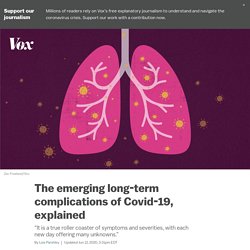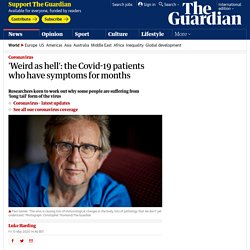

Nbcnews: CDC: One-third of COVID-19 patients who aren't hospitalized have long-term illness. The Centers for Disease Control and Prevention acknowledged Friday that a significant number of COVID-19 patients do not recover quickly, and instead experience ongoing symptoms, such as fatigue and cough.

As many as a third of patients who were never sick enough to be hospitalized are not back to their usual health up to three weeks after their diagnosis, the report found. Full coverage of the coronavirus outbreak "COVID-19 can result in prolonged illness even among persons with milder outpatient illness, including young adults," the report's authors wrote. The acknowledgement is welcome news to patients who call themselves "long-haulers" — suffering from debilitating symptoms weeks and even months after their initial infection.
Let our news meet your inbox. Scientists just beginning to understand the many health problems caused by COVID-19. Mounting clues suggest the coronavirus might trigger diabetes. In mid-April, Finn Gnadt, an 18-year-old student from Kiel, Germany, learnt that he had been infected with the SARS-CoV-2 coronavirus despite feeling well.

Gnadt’s parents had fallen ill after a river cruise in Austria, so his family was tested for virus antibodies, which are produced in response to infection. Gnadt thought he had endured the infection unscathed, but days later, he started to feel worn out and exceedingly thirsty. In early May, he was diagnosed with type 1 diabetes, and his physician, Tim Hollstein at the University Hospital Schleswig-Holstein in Kiel, suggested that the sudden onset might be linked to the viral infection. In most people with type 1 diabetes, the body’s immune cells start destroying β-cells — which are responsible for producing the hormone insulin — in the pancreas, often suddenly. Diabetes is already known to be a key risk factor for developing severe COVID-191 and people with the condition are more likely to die2. Growing evidence Diabetes database.
The neurology of COVID-19 revisited: A proposal from the Environmental Neurology Specialty Group of the World Federation of Neurology to implement international neurological registries. National Geographic: Inflamed brains, toe rashes, strokes: Why COVID-19's weirdest symptoms are only emerging now - May 21, 2020 By Amy McKeever. Sepsis & COVID-19. Long Term Effects -- COVID-19 and Sepsis. Coronavirus long-term effects: Some Covid-19 survivors face lung scarring, heart damage, and anxiety. At first, Lauren Nichols tried to explain away her symptoms.

In early March, the healthy 32-year-old felt an intense burning sensation, like acid reflux, when she breathed. Embarrassed, she didn’t initially seek medical care. When her shortness of breath kept getting worse, her doctor tested her for Covid-19. Her results came back positive. But for Nichols, that was just the beginning. “The guidelines that were provided by the CDC [Centers for Disease Control and Prevention] were not appropriately capturing the symptoms that I was experiencing, which in turn meant that the medical community was unable to ‘validate’ my symptoms,” she says. Nurses post startling examples of what being 'recovered' from COVID-19 can look like. Wounded In Action From Covid-19.
In our battle against SARS-CoV-2, we have mobilized as if we were at war with an alien invader.

But this enemy is not from outer space. We and SARS-CoV-2 spring from the same source, the deep reservoir of all life on earth. Each species, struggling to survive. With humans and SARS-CoV-2 that struggle binds us together, as we happen to be the choice ecological niche for this particular virus—conveniently numerous, crowded together, and traveling freely across continents.
Normally when we enter into battle, we count both the dead and wounded. Thanks to a recent story in the Washington Post we can now put faces to a few of our wounded survivors. Covid-19 is no mild cold that kills just a few, nor is it a mirror of the flu from which most recover intact. COVID-19 Can Last for Several Months - by Ed Yong - The Atlantic. Editor’s Note:The Atlantic is making vital coverage of the coronavirus available to all readers.

Find the collection here. For Vonny LeClerc, day one was March 16. Hours after British Prime Minister Boris Johnson instated stringent social-distancing measures to halt the SARS-CoV-2 coronavirus, LeClerc, a Glasgow-based journalist, arrived home feeling shivery and flushed. Over the next few days, she developed a cough, chest pain, aching joints, and a prickling sensation on her skin.
After a week of bed rest, she started improving. To hear more feature stories, get the Audm iPhone app. When I spoke with LeClerc on day 66, she was still experiencing waves of symptoms. 'Weird as hell’: the Covid-19 patients who have symptoms for months. In mid-March Paul Garner developed what he thought was a “bit of a cough”.

A professor of infectious diseases, Garner was discussing the new coronavirus with David Nabarro, the UK’s special envoy on the pandemic. At the end of the Zoom call, Nabarro advised Garner to go home immediately and to self-isolate. Garner did. He felt no more than a “little bit off”. Days later, he found himself fighting a raging infection. Garner refers to himself wryly as a member of the “Boris Johnson herd immunity group”.
There is growing evidence that the virus causes a far greater array of symptoms than was previously understood. He had a muggy head, upset stomach, tinnitus, pins and needles, breathlessness, dizziness and arthritis in the hands. Since his piece was published, Garner has received emails and tearful phone calls from grateful readers who thought they were going mad. The Waking Nightmare of ICU Delirium for COVID-19 Patients. Treatment & Prevention (COVID-19) HOW COVID-19 attacks the Body. Risk Factors (COVID-19) COVID-19.